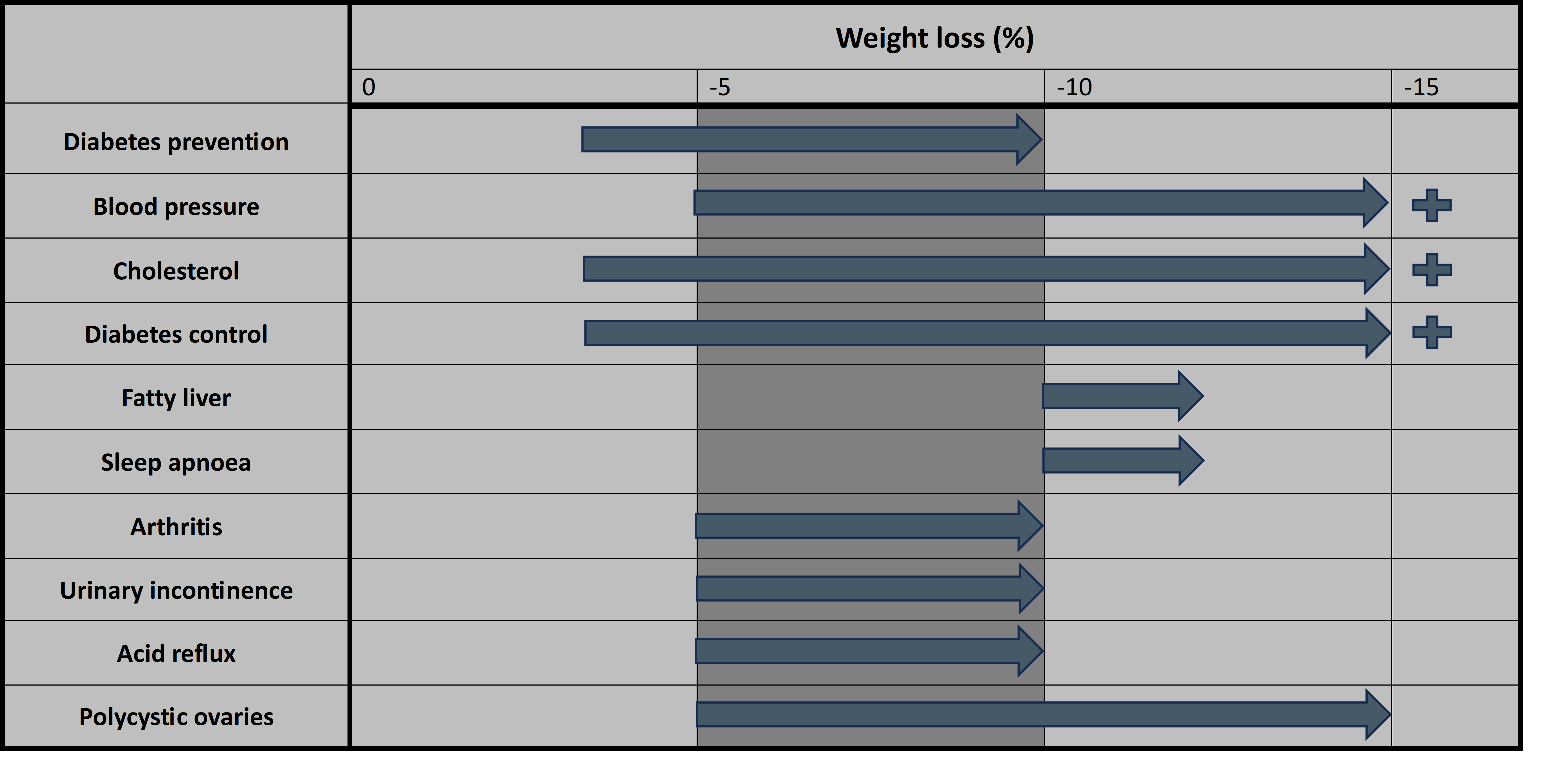Obesity
Obesity is a worldwide issue. Obesity rates are increasing and amongst the OECD, and NZ has the 4th highest rate (behind USA, Chile, and Mexico).
Obesity Update 2017
Results from the 2020/21 New Zealand Health Survey showed that one in three adults (34.4%) had obesity (around 1.5 million people).
Ministry of Healthy – New Zealand Health Survey, Annual Data Explorer – Nov 2020
Obesity is a major health concern and is recognized as a medical condition in its own right. It effects almost every system in the body and is directly related to a large number of health conditions. These include:
- Heart disease, blood pressure, stroke
- Diabetes
- Acid reflux and heartburn
- Gallstones and liver disease
- Kidney disease and renal failure
- Urinary incontinence
- Breathing disorders such as obstructive sleep apnoea
- Arthritis and poor mobility
- Infertility, irregular menstruation and polycystic ovarian syndrome
- A number of cancers
- Mental wellbeing
It is difficult to achieve substantial and sustained weight loss. Most people with obesity have tried on many occasions to lose weight. Many people report trying different approaches and getting mixed results.
It’s a common misconception that the solution to obesity is to just eat less and exercise more. While energy balance is an important part of the equation, obesity is complex.
Obesity is a chronic issue and there are many factors that contribute including:
- Our environment: a lot of our day-to-day tasks have been automated and are no longer geared towards physical activity. We all tend to be more sedentary than generations before.
- Our diet: now calorie rich, ready-made foods are easily accessible. Preparing our own meals from whole foods is not as common place as it once was. In general, our portion sizes have increased over the decades.
- Sociocultural: Eating is not just about consuming fuel for our bodies but it is also a social and cultural activity. These influences contribute to the challenges of weight loss.
- Biology: Many biological pathways are involved in weight loss and weight gain. At a chemical and hormonal level, our bodies try hard to defend our current weight. They resist weight loss to a greater extent than weight gain. When we lose weight, our bodies go into a biochemical overdrive in an attempt to return us to the weight we were. This is a concept known as your weight ‘set point’. A useful resource that explains this is a YouTube video called ‘Time to Act on Obesity.’
Bariatric surgery can be an extremely helpful tool to overcome these biological pathways. It works at a biochemical and hormonal level to facilitate weight loss. But it is also important to address sociocultural, behavioral (diet) and environmental factors for long term success.
Health Benefits of Weight Loss
There is good evidence that health improvement is seen with modest weight loss. Most obesity-related health conditions improve after 5-10% weight loss and this is often achievable with small lifestyle changes. This is demonstrated in the following figure.

Cefalu W et al. Diabetes care 2015;38(8)1567-82
Lean et al. Lancet 2018;391:541-51
As already mentioned, sustained weight loss can be challenging do to a number of factors including weight loss biology. But the health benefits of modest weight loss warrant acknowledgement.
BMI Calculator
Obesity is best defined by body mass index (BMI). While not ideal, it is the best measure we have. BMI is calculated by your weight (kg)/height (m)2 and health categories defined as follows:
BMI TABLE
| 18.5 – 24.9 | Healthy Weight |
| 25.0 – 29.9 | Overweight |
| 30.0 – 34.9 | Obesity class 1 |
| 35.0 – 39.9 | Obesity class 2 |
| > 40.0 | Obesity class 3 |
Calculate your BMI
Excess weight that is carried centrally (i.e. around your abdominal organs) is particularly bad for your metabolic health. Waist circumference is another measure that can be used to identify those people who are at increased risk of weight-related health problems. High risk waist circumference is defined as:
Male > 102cm
Female > 88cm
Weight loss options
Bariatric surgery has the best evidence for substantial and sustained weight loss. However, surgery is not right for everyone and given health improvement occurs with modest (5-10%) weight loss all options should be considered.
#1: Lifestyle
Dietary modification and increased activity have been proven to result on average 3-5% weight loss. The assistance of a Registered Dietitian can be very useful, even to those with a ‘healthy diet.’ Exercise has many additional non-weight-related health benefits and plays a crucial role in long-term weight maintenance. Even if you ultimately go on to have surgery, it’s important to put in place health eating habits.
#2: Meal Plan
A meal replacement plan can be a useful strategy for some. This is best done with the oversight of a Registered Dietitian and usually involves replacing a single meal a day with a low-calorie, high protein replacement product.
#3: Medication
Weight loss medication is a rapidly expanding medical field. Historically, options were very limited and of little value. Today, there are a number of effective medications in regular use worldwide, with the two best options currently available in New Zealand being Saxenda and Contrave. On average, when combined with healthy lifestyle change, these medications result in 5-10% weight loss. Whilst available, these are currently not funded and come with a monthly cost.
Find out more about weight loss pharmacotherapy:
The team at Northland Health & Weight have clinical experience with all these options and can tailor your weight loss management plan to best suit your needs.

